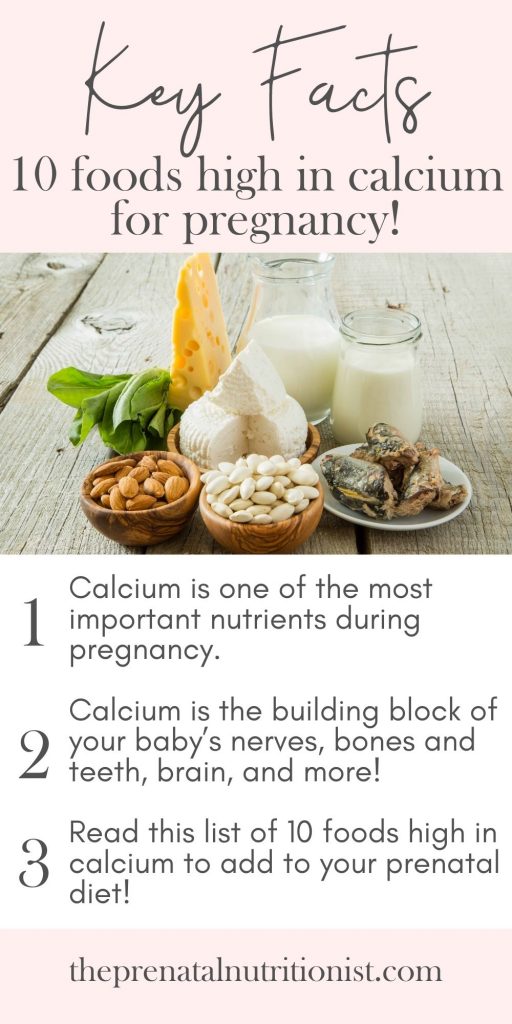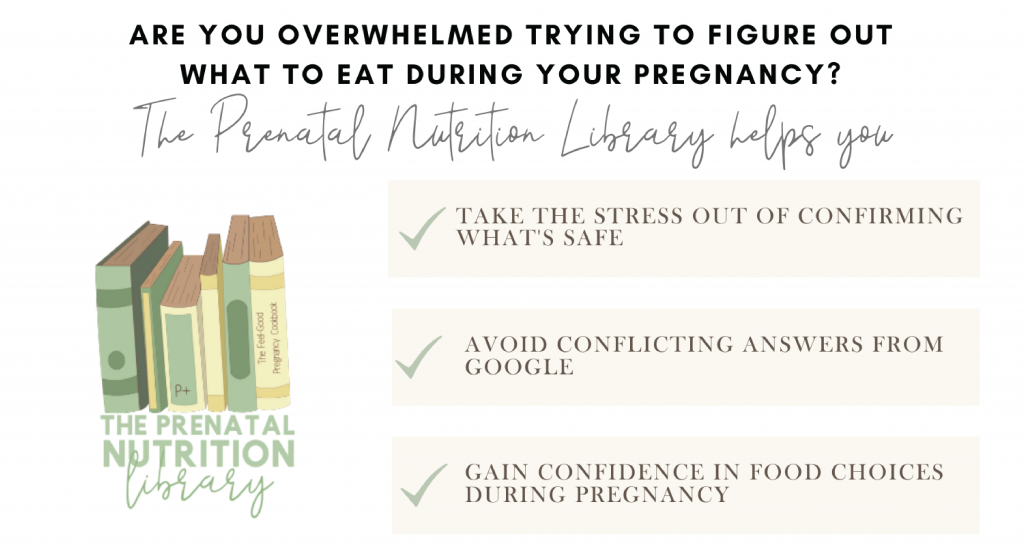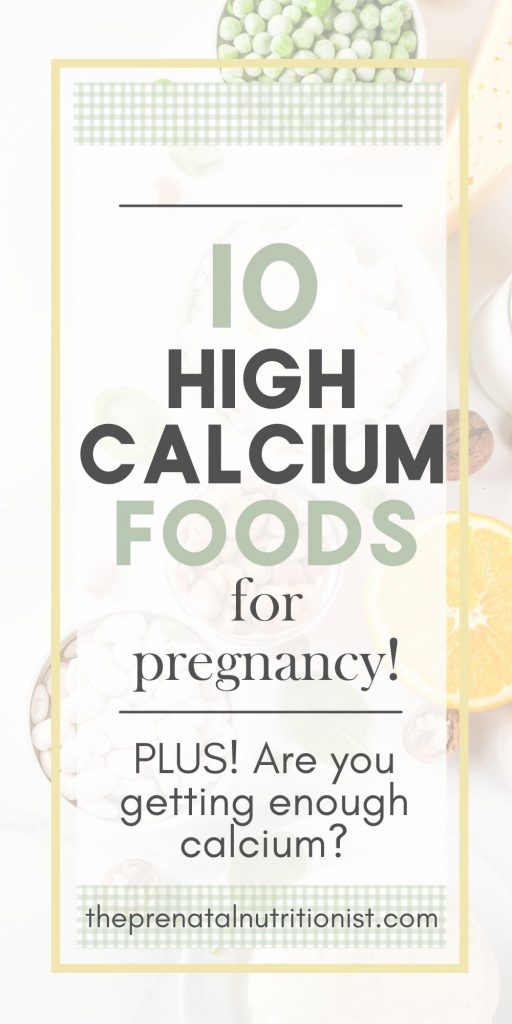
10 High Calcium Foods For Pregnancy
If there’s one thing we can’t stress enough, it’s how important nutrition is during preconception and pregnancy. Your pregnant body will do whatever it can to provide your developing baby with the nutrients he or she needs. If you are lacking in calcium intake during pregnancy, your body will often begin sending any calcium it can get to your baby. This leaves behind minimal for your body! Unfortunately, this can leave your bones and teeth in need of a serious calcium boost.
Calcium is an important and essential nutrient during pregnancy. That’s why it is essential to make sure you’re getting the recommended amount of calcium each day, throughout your whole pregnancy! According to the National Institutes of Health, pregnant and lactating women aged 18 years and older should aim to consume at least 1,000 milligrams (mg) of calcium each day. And pregnant and lactating women aged 18 and younger should consume a bit more with the recommendation of at least 1,300 mg each day.
Calcium can benefit your growing baby in soooo many ways. It’s a key mineral in the formation of your baby’s strong bones and teeth, normal heart rhythm development, nerve signaling, and the list goes on and on! There is also ongoing research into the important role of calcium in the proper development of a baby’s heart and nerves. Calcium may also improve the baby’s blood-clotting abilities.
Because calcium is so important during pregnancy, we’re sharing a roundup of ten high calcium foods that can help expecting mothers boost and maintain their calcium intake! And don’t worry, we’ve made sure to include plenty of options for those that may be lactose intolerant or dairy-free.
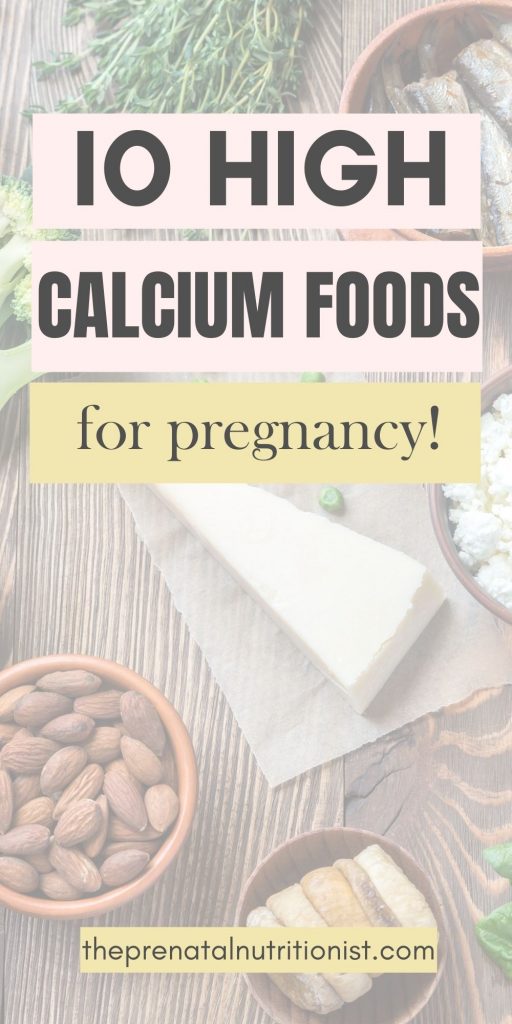
10 High Calcium Foods For Pregnancy
Milk
Dairy products like milk are some of the best sources of calcium out there! Just one cup (8 fluid ounces) of whole milk contains over 300 mg of calcium. This is close to about 1/3 of the recommended daily amount for calcium. Remember, according to the National Institutes of Health, the RDA for calcium during pregnancy is 1,000 mg/day. One cup of whole milk also contains 8 grams of protein, vitamin A, vitamin D, phosphorus, and iodine. Milk is a great source of calcium, but there are other options out there too (as you’ll see below). It is great to consume a variety of foods and drinks that also contain calcium to meet your needs.
Yogurt
Yogurt is an excellent source of calcium. One 6-ounce container of whole-milk yogurt contains over 200 mg of calcium! Plus, Greek yogurt in particular is a great boost of protein too. It can be a delicious part of a healthy breakfast or healthy snack for pregnancy. Plus, if you’re in the preconception phase full-fat dairy products are known for being fertility-boosting foods.
Cheese
Contrary to popular belief, cheeses can be a safe option for pregnancy and they are a rich source of calcium. For, example, cheddar, parmesan, and gruyere. In fact, just one slice (17 grams) of cheddar cheese contains about 120 mg of calcium. From a food safety standpoint, the best practice is to stick with pasteurized cheese options during pregnancy. Depending on the type, cheese can also provide a great boost of nutrients like protein, vitamin A, and vitamin K.
Chia Seeds
Chia seeds are a good source of calcium, fiber, and omega-3 fatty acids. There are many ways to use chia seeds, including chia pudding, added to energy bites, or as a topping sprinkled over a healthy breakfast for pregnancy like oatmeal, avocado toast, or Greek yogurt. Two tablespoons of chia seeds contain over 40 mg of calcium.
Almonds
Almonds are delicious and a great snack idea for pregnant women. They also make a tasty topping for salads, yogurt, and oatmeal. One handful (about 1/3 cup) of almonds contains 80 mg of calcium, making almonds a great way to boost your calcium intake throughout the day. Almonds are also a super nutrient-dense choice for other reasons too! They are full of healthy fats, some protein to keep you going, fiber, antioxidants, vitamin E, magnesium, and more.
Tofu
Soy can be a controversial topic. When consuming soy aim to focus on whole food forms versus more highly processed forms of soy, like soy isolate protein powder. Tofu can contain anywhere from around 170 mg to 400 plus mg of calcium per half-cup serving depending on the type of tofu. Several tofu options have calcium added. It is also a source of plant-based protein, iron, magnesium, and selenium.
Dried Figs
According to the U.S. Department of Agriculture’s database, two dried figs contain 27 mg of calcium. Dried figs also provide an added boost of fiber, but it’s important to remember that they are also calorie-dense. They can fit as part of a well-rounded, nutrient-dense diet for pregnancy, however, we do encourage keeping portions in mind. Dried figs are also a good source of nutrients like phosphorus, vitamin K, potassium, and magnesium which are great for bone health.
Collard Greens
Did you know that cooking some types of leafy greens actually helps your body absorb some vitamins and minerals better? That is the case when it comes to collard greens and calcium! When cooked, collard greens are a rich source of calcium with over 260 mg of calcium in just one cup. Collard greens also contain fiber, some plant-based (non-heme) iron, vitamins A, C, K, and B6, and folate. Incorporating more dark leafy greens like collard greens and kale can be a nutrient-dense option for pregnancy.
Broccoli
Broccoli is versatile, easy to cook, and super nutritious. Plus, fresh or frozen cooked broccoli is an easy addition to any lunch or dinner meal. One single cup of cooked broccoli contains over 60 mg of calcium and other essential nutrients like potassium, vitamin C, vitamin A, and fiber. Feel free to incorporate cooked broccoli into your diet as often as you like!
Sardines & Other High-Quality Seafood
High-quality seafood such as sardines, salmon, and shrimp are good sources of calcium. Some seafood options will contain more calcium than others. They don’t all contain as much calcium as most dairy products, but they can be a great boost and will help to meet your calcium and other nutrient needs.
According to the U.S. Department of Agriculture (USDA), one can (3.75 ounces) of sardines contains about 351 mg of calcium. We recommend trying to incorporate high-quality, low mercury seafood options into your diet a few times per week throughout pregnancy.
Seafood is important because, in addition to calcium, it is also a great source of other beneficial nutrients for pregnancy, including omega-3 fatty acids, iron, and protein! There are a few high-mercury seafood options that can be dangerous during pregnancy. Check out our blog about Safe Seafood During Pregnancy to learn more about safe options for pregnancy.
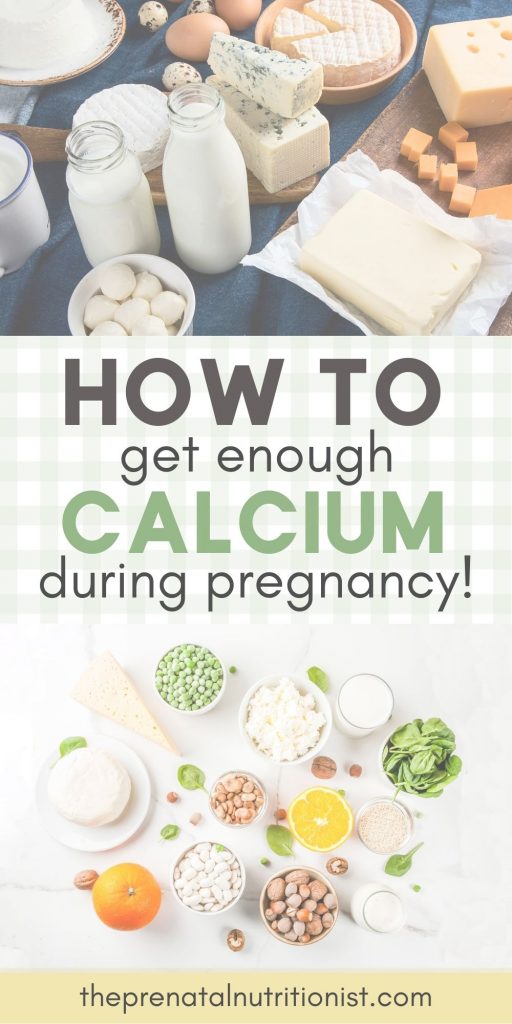
Are you meeting the recommended daily value for calcium during pregnancy?
Making sure that you meet the daily recommended intake of calcium each and every day during pregnancy is important for many reasons. Calcium has many benefits during pregnancy and is one of the key minerals that is needed for the formation of babies strong bones and teeth. Plus, calcium is just as important for you during pregnancy as your body grows and goes through changes associated with pregnancy. Calcium is a key mineral for moms’ teeth, bones, and body to remain healthy and nourished throughout pregnancy and after delivery too.
If you have any additional questions about calcium or prenatal nutrition, be sure to check out The Prenatal Nutrition Library. TPNL will help you to feel confident in your food choices for two during pregnancy. Also, make sure to download The Prenatal Nutrition Library app to have all this information right at your fingertips!
